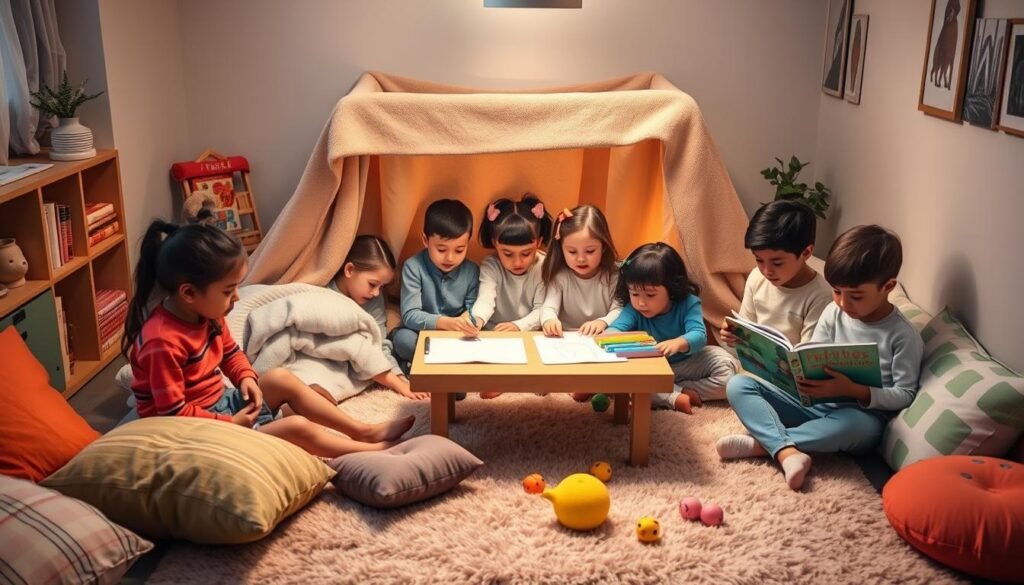Did you know 62% of people with anxiety disorders feel more anxious during the holidays? This season brings joy and family time. But it can also increase stress for those with generalized anxiety disorder (GAD). The stress from social events, travel, and high expectations can be too much.
This article will share expert advice on handling holiday anxiety. You’ll learn the difference between normal holiday stress and anxiety disorders. Plus, you’ll find coping strategies to look after your mental health. Experts recommend self-care routines and understanding your limits for a happier season.
Key Takeaways
- Many individuals with anxiety disorders face heightened anxiety during the holidays.
- Being aware of personal limitations and setting boundaries is essential for managing stress.
- Mindfulness techniques can effectively reduce social anxiety during holiday events.
- Maintaining healthy routines, such as proper sleep and nutrition, supports emotional well-being.
- Building a supportive network can help alleviate feelings of isolation and anxiety.
Understanding Holiday Anxiety
The holiday season is often a mix of joy and stress. It can really affect our mental health. Many feel more anxious during this time due to family gatherings and social pressures. Knowing why this happens is key to handle the stress better.
The Impact of the Holiday Season on Mental Health
During holidays, we worry about making everything perfect. This can be really hard for some, especially if they’ve had a tough time before. Stress can show up in our bodies, making us tense and unfocused. In the US, around 40 million adults deal with anxiety disorders. The holidays can make things worse, leaving some feeling lonely or left out.
Normal Holiday Worries vs. Generalized Anxiety Disorder
It’s normal to worry a bit during the holidays. This usually involves things like planning or gifts but fades after. But for those with Generalized Anxiety Disorder (GAD), their worries don’t go away easily. They feel anxious all the time, not just during the holidays.
The stress of buying gifts and planning travels can add to anxiety. Knowing the difference between normal worry and GAD is important. It helps people understand their feelings and seek help when needed. Handling stress wisely can lessen holiday anxiety, stopping it from getting worse.
Recognizing the Signs of Holiday Anxiety
The holiday season can often be joyful but also brings challenges. These can lead to increased anxiety in some people. Knowing what causes these feelings and how to deal with them is important.
Identifying Symptoms and Triggers
About 65% of those with holiday anxiety might feel physically tense or restless. Signs to look out for include:
- Increased irritability
- Chronic fatigue or disrupted sleep patterns
- Digestive issues like upset stomachs
- Avoidance of social gatherings
Triggers like big gatherings and financial stress can make anxiety worse. Feeling like you have to create the perfect holiday can lead to disappointment.
The Role of Expectations and Social Pressures
During the holidays, social and financial pressures can make people more anxious. About 38% feel stressed about money and living up to expectations. This can make individuals feel overwhelmed and not enough.
If you’re feeling any of these symptoms, getting help is a good idea. Yet, only 52% of those struggling seek assistance. This shows the importance of knowing how to help yourself. For tips on managing anxiety, visit here.
Expert Tips for Stress Management
The holiday season can be exciting but also stressful for many. Practicing stress management techniques is crucial. It helps reduce anxiety and makes the holidays better. By setting realistic goals and balancing family time, you can enjoy this period more.
Setting Realistic Expectations
Managing expectations is key to reducing stress during the holidays. Trying to make everything perfect often leads to disappointment. Aim for achievable goals that allow for changes. This can lessen stress and keep you positive. Remember, one in three Americans expects more stress than before. Knowing this can make anxiety feel more normal and manageable.
Finding Balance During Family Gatherings
Family events can be joyful but stressful, especially for those feeling lonely or depressed in winter. It’s important to balance socializing with personal time. Here are some strategies to help:
- Limit time at events to prevent feeling overwhelmed.
- It’s okay to leave if you start feeling anxious.
- Focus on meaningful interactions, not the number.
Following these tips can help you socialize while taking care of your mental health. Remember, regular exercise, like 20 minutes of active walking four to five times a week, boosts mood and energy.
| Technique | Description |
|---|---|
| Mindfulness Practices | Focusing on the present to reduce stress and improve mental clarity. |
| Sleep Hygiene | Aiming for 7 to 8 hours of sleep for good health during holidays. |
| Social Connections | Keeping in touch with loved ones to fight loneliness. |
| Limit Social Media | Using social media less to avoid stress from comparisons. |
Effective Coping Strategies for Holiday Anxiety
The holiday season often raises stress and anxiety. It comes with high expectations and unique challenges. Learning how to cope is key. Mindfulness and breathing exercises are great for dealing with the stress that comes with holidays and traveling.
Mindfulness Techniques for Reducing Stress
Mindfulness helps you focus on the now, easing anxiety. Meditation and yoga are great during this busy time. They help calm your mind, make you feel better emotionally, and give you a fresh look at stressful times.
Breathing Exercises to Alleviate Anxiety
Breathing exercises are great for easing anxiety, especially during the holidays. The 4-7-8 breathing method is one example. You breathe in for four seconds, hold it for seven, then exhale for eight. This simple method helps you relax and can be done anywhere.

Using these techniques can really help with holiday stress. If you find you’re still feeling anxious or down, it’s okay to ask for help. Talking to a counselor or joining a support group can make a big difference.
Travel Planning Tips to Reduce Anxiety
Traveling during the holidays can be stressful, especially in crowded places like airports. Good travel planning can reduce this stress and make the trip better. It’s important to recognize signs of anxiety before traveling and organize your trip to make the journey smoother.
Preparing for Crowded Spaces
It’s crucial to know how to handle crowded areas when traveling. Tips to manage anxiety include:
- Packing early to avoid last-minute stress.
- Traveling during less busy times if you can.
- Getting to know the layout of airports and boarding processes.
- Staying updated on travel news with good apps.
- Bringing things that calm you, like music or stress balls.
Organizing Travel Details Ahead of Time
Planning your travel details early can really help lower stress. Essential tips include:
- Make a full list of what to pack so you don’t forget anything.
- Plan when to do each task, from booking your flight to arranging where you’ll stay.
- Have emergency contacts and key documents easy to reach.
- Prepare for problems before they happen, like packing an anti-anxiety kit with medication, maps, and first aid.
- See travel challenges as chances to grow, keeping a positive attitude.
About 18% of people in the United States deal with anxiety disorders. It’s important to see pre-travel anxiety as a real issue. Attending seminars, using apps, and joining support groups can improve coping skills. Making simple changes in how you plan travel can make your holidays more enjoyable and less stressful.
Self-Care Practices to Improve Emotional Well-Being
The holiday season can be busy, making self-care very important. Stress often comes from money worries and feeling alone. By doing self-care, we can lessen these stresses for a better holiday time.
Maintaining Healthy Routines During the Holidays
Keeping up with healthy habits matters a lot. Eating well and getting plenty of sleep are key for our mental health.
Doing small things like taking time to relax and enjoying fun activities helps too. Being active also helps take our mind off stress and makes us happier.
Importance of Nutrition and Sleep
Good nutrition is crucial for feeling emotionally well during the holidays. Eating right keeps us energized and helps fight off feelings of anxiety and sadness.
Getting enough sleep also plays a big part in controlling our moods and dealing with stress. Knowing how diet, sleep, and mental health connect shows why self-care is essential. For more tips on handling holiday stress, check out self-care techniques for better well-being and less worry.

Handling Social Pressures and Obligations
The holiday season often brings social pressures. It’s important to navigate social obligations wisely. Learning how to say no can cut down on stress and anxiety. It’s also vital to put your well-being before societal expectations for a healthier mindset. List events that truly matter to you.
Learning to Say No and Prioritizing Yourself
Setting boundaries is key to managing social pressures. This might mean choosing which events you attend. Or deciding who you will spend time with to avoid discomfort. Letting your family and friends know what you need helps. It keeps you comfortable while still joining in the fun. Having a trusted friend with you at events can also offer support.
Strategies for Navigating Uncomfortable Social Situations
Being prepared is essential for uncomfortable social situations. Think of topics to talk about and rehearse answers to common questions. Visualizing safe places can also help reduce worry before it starts. Try to arrive early to events to get comfortable. And have a plan for leaving gracefully if you need to. Using grounding methods or deep breathing can help you feel in control.
| Strategy | Description |
|---|---|
| Setting Boundaries | Limit event attendance and avoid overwhelming interactions. |
| Bringing Support | A trusted friend can ease anxiety in social settings. |
| Preparation | Brainstorm conversation starters and rehearse responses. |
| Grounding Techniques | Practice deep breathing or envision safe spaces during gatherings. |
| Communicating Needs | Effectively expressing needs can help manage social expectations. |
Using these strategies can help you deal with social pressures during the holidays. It helps you balance your needs with the festivities. This can improve your mental health and make the season more enjoyable. For more help with holiday stress, check out these valuable resources.
Support Strategies for Anxious Children
During the holiday season, supporting children is key to reducing holiday stress. It’s good to talk openly about their feelings. This helps lessen their anxiety. Discussing their worries, instead of ignoring them, helps kids find ways to cope. This teaches them to face their fears. Here are some ways to help children with anxiety during the holidays.
How to Talk to Kids About Holiday Stress
Creating a space for open dialogue is crucial. This allows kids to share their concerns freely. Ask open-ended questions to encourage them to open up. It’s important for parents to show they believe in their kids’ ability to handle anxiety. While acknowledging their fears, don’t make them bigger. Instead, offer empathy and urge them to face their fears. Talk about possible scary situations and how they can deal with them. This helps children feel ready.
Creating a Safe Space for Children During Festivities
Having a safe space during holiday events is important for emotional well-being. A quiet room or a way to step back can help with anxiety. Keeping normal routines, like bedtime, offers stability. An “emergency bag” with items like fidget toys or headphones can be a big help. Letting family members know what upsets your child reduces stress.

| Support Strategy | Description |
|---|---|
| Open Communication | Engage in conversations using open-ended questions to express feelings without pressure. |
| Establish Safe Spaces | Provide quiet rooms or escape routes for children to retreat when feeling anxious. |
| Maintain Consistent Routines | Keep bedtime and daily schedules regular to foster a sense of security. |
| Engage in Preparations | Include children in planning holiday activities to instill a sense of control. |
| Provide Coping Tools | Stock an “emergency bag” with fidget toys and calming items for quick access. |
| Communicate with Relatives | Make sure family members are aware of the child’s triggers to minimize stress during gatherings. |
Managing Financial Burdens During the Holidays
The holiday season often brings joy and unity. But, it can also lead to significant financial stress for many. Stress from holiday spending can dim the festive spirit. Effective budgeting tips and understanding gift alternatives can reduce this stress. They help maintain the joy of giving without financial strain.
Budgeting Tips to Ease Holiday Spending Stress
Creating a budget is crucial for handling financial stress during the holidays. Data shows 28% of holiday shoppers worry about shopping costs. A spending plan helps prioritize expenses and reduces the chance of overspending. Here are useful budgeting tips:
- Assess your financial situation: Review your income and expenses to set a realistic holiday budget.
- Create a list: List everyone you plan to buy gifts for, setting a spending limit for each.
- Consider discounts: Use sales, promotions, and apps to find the best deals.
- Utilize unused resources: Use any unused gift cards, which are about $200 for many Americans, for gift purchases.
Alternatives to Traditional Gift Giving
About 16% of shoppers feel the need to spend more than they can afford, adding to holiday stress. Consider these thoughtful alternatives to traditional gifts:
- Secret Santa: A group gift exchange reduces the number of gifts each person buys.
- Homemade gifts: Give baked goods or crafts, which can be more meaningful.
- Experience gifts: Choose experiences like show tickets, cooking classes, or days out instead of material items.
| Financial Consideration | Percentage of Shoppers |
|---|---|
| Stress about holiday shopping costs | 28% |
| Plan to spend the same or more than last year | 67% |
| Anticipate budget strain | 28% |
| Increased pressure to overspend | 16% |
| Experience holiday anxiety | 90% |
By using these budgeting tips and exploring gift alternatives, people can ease holiday financial stress. This approach makes holidays more enjoyable and helps maintain financial health all year.
Seeking Professional Help for Holiday Anxiety
Many people feel more anxious during the holidays. This can lead them to seek professional help. When stress and anxiety are too much, knowing when to get therapy or counseling is key. It helps manage stress and improve how we feel emotionally.
When to Consider Therapy or Counseling
Holiday anxiety shows up in different ways, like tense muscles, headaches, and feeling tired. If these symptoms don’t go away, it’s time to seek professional help. This anxiety comes from pressure about money and tough family situations. For instance, half of Americans said the holidays were more stressful financially than before. Plus, 65% of them were worried about their mental health too. Therapy can help deal with these financial and emotional issues, leading to relief.
Resources for Additional Support
There are many resources out there for extra help. Cognitive-Behavioral Therapy (CBT) is good for dealing with negative thoughts related to anxiety. Therapy often includes mindfulness techniques, like meditation and deep breathing. For family-related stress, family therapy can help. It opens up communication and solves conflicts. If you lost someone dear, grief counseling during the holidays can help too. Trying therapies like these can help understand and manage holiday anxiety better.
| Therapy Type | Description | Benefits |
|---|---|---|
| Cognitive-Behavioral Therapy (CBT) | A therapeutic approach focusing on changing negative thought patterns. | Helps manage anxiety and develop healthier thinking. |
| Mindfulness Practices | Techniques such as meditation and deep breathing. | Aids in staying present and reducing stress levels. |
| Family Therapy | Facilitates communication and resolves conflicts among family members. | Provides support in managing family dynamics during the holidays. |
| Grief Counseling | Support for individuals coping with loss. | Helps navigate feelings of grief, particularly during the holiday season. |
Conclusion
Dealing with holiday stress means understanding the unique challenges of the season. Issues like money worries from buying gifts and feeling overwhelmed by social events are common. People must tackle these challenges to enjoy the holidays while looking after their mental well-being. Identifying anxiety signs and learning to cope can improve symptoms, build strength, and bring people together.
Even though holidays are seen as happy times, they can cause more anxiety for some. This can especially affect those already dealing with anxiety or depression. Staying realistic, keeping up with healthy habits, and knowing when to say no can lessen stress. Strategies tailored to each person are key to feeling better during the holidays.
Facing holiday anxiety is something many people share. With useful strategies and support, focus can shift from trying to be perfect to making meaningful connections. Embracing the holiday spirit while taking care of mental health is important. Asking for help and practicing mindfulness can help turn stress into something you can handle better.